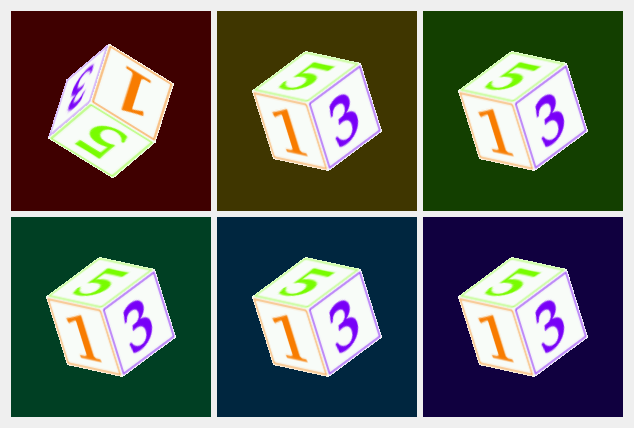Texture Example#
The Textures example demonstrates the use of Qt’s image classes as textures in applications that use both OpenGL and Qt to display graphics.

<!DOCTYPE RCC><RCC version="1.0">
<qresource>
<file>images/side1.png</file>
<file>images/side2.png</file>
<file>images/side3.png</file>
<file>images/side4.png</file>
<file>images/side5.png</file>
<file>images/side6.png</file>
</qresource>
</RCC>
# Copyright (C) 2013 Riverbank Computing Limited.
# Copyright (C) 2022 The Qt Company Ltd.
# SPDX-License-Identifier: LicenseRef-Qt-Commercial OR BSD-3-Clause
"""PySide6 port of the opengl/textures example from Qt v6.x showing the use
of legacy OpenGL functions with QOpenGLVersionFunctionsFactory."""
import sys
from PySide6.QtCore import QPoint, QSize, Qt, QTimer, Signal
from PySide6.QtGui import QColor, QImage, QSurfaceFormat
from PySide6.QtWidgets import QApplication, QGridLayout, QMessageBox, QWidget
from PySide6.QtOpenGL import (QOpenGLTexture, QOpenGLVersionFunctionsFactory,
QOpenGLVersionProfile)
from PySide6.QtOpenGLWidgets import QOpenGLWidget
try:
from OpenGL import GL
except ImportError:
app = QApplication(sys.argv)
messageBox = QMessageBox(QMessageBox.Critical, "OpenGL textures",
"PyOpenGL must be installed to run this example.",
QMessageBox.Close)
messageBox.setDetailedText("Run:\npip install PyOpenGL PyOpenGL_accelerate")
messageBox.exec()
sys.exit(1)
import textures_rc
class GLWidget(QOpenGLWidget):
sharedObject = 0
refCount = 0
coords = (
( ( +1, -1, -1 ), ( -1, -1, -1 ), ( -1, +1, -1 ), ( +1, +1, -1 ) ),
( ( +1, +1, -1 ), ( -1, +1, -1 ), ( -1, +1, +1 ), ( +1, +1, +1 ) ),
( ( +1, -1, +1 ), ( +1, -1, -1 ), ( +1, +1, -1 ), ( +1, +1, +1 ) ),
( ( -1, -1, -1 ), ( -1, -1, +1 ), ( -1, +1, +1 ), ( -1, +1, -1 ) ),
( ( +1, -1, +1 ), ( -1, -1, +1 ), ( -1, -1, -1 ), ( +1, -1, -1 ) ),
( ( -1, -1, +1 ), ( +1, -1, +1 ), ( +1, +1, +1 ), ( -1, +1, +1 ) )
)
clicked = Signal()
def __init__(self, parent):
super().__init__(parent)
self.clearColor = Qt.black
self.xRot = 0
self.yRot = 0
self.zRot = 0
self.clearColor = QColor()
self.lastPos = QPoint()
self.funcs = None
def freeGLResources(self):
GLWidget.refCount -= 1
if GLWidget.refCount == 0:
self.makeCurrent()
self.funcs.glDeleteLists(self.__class__.sharedObject, 1)
def minimumSizeHint(self):
return QSize(50, 50)
def sizeHint(self):
return QSize(200, 200)
def rotateBy(self, xAngle, yAngle, zAngle):
self.xRot = (self.xRot + xAngle) % 5760
self.yRot = (self.yRot + yAngle) % 5760
self.zRot = (self.zRot + zAngle) % 5760
self.update()
def setClearColor(self, color):
self.clearColor = color
self.update()
def initializeGL(self):
profile = QOpenGLVersionProfile()
profile.setVersion(3, 2)
profile.setProfile(QSurfaceFormat.CompatibilityProfile)
self.funcs = QOpenGLVersionFunctionsFactory.get(profile)
self.funcs.initializeOpenGLFunctions()
if not GLWidget.sharedObject:
self.textures = []
for i in range(6):
image = QImage(f":/images/side{i + 1}.png")
self.textures.append(QOpenGLTexture(image))
GLWidget.sharedObject = self.makeObject()
GLWidget.refCount += 1
self.funcs.glEnable(GL.GL_DEPTH_TEST)
self.funcs.glEnable(GL.GL_CULL_FACE)
self.funcs.glEnable(GL.GL_TEXTURE_2D)
def paintGL(self):
self.funcs.glClearColor(self.clearColor.red(), self.clearColor.green(),
self.clearColor.blue(), 1)
self.funcs.glClear(GL.GL_COLOR_BUFFER_BIT | GL.GL_DEPTH_BUFFER_BIT)
self.funcs.glLoadIdentity()
self.funcs.glTranslated(0.0, 0.0, -10.0)
self.funcs.glRotated(self.xRot / 16.0, 1.0, 0.0, 0.0)
self.funcs.glRotated(self.yRot / 16.0, 0.0, 1.0, 0.0)
self.funcs.glRotated(self.zRot / 16.0, 0.0, 0.0, 1.0)
self.funcs.glCallList(GLWidget.sharedObject)
def resizeGL(self, width, height):
side = min(width, height)
x = int((width - side) / 2)
y = int((height - side) / 2)
self.funcs.glViewport(x, y, side, side)
self.funcs.glMatrixMode(GL.GL_PROJECTION)
self.funcs.glLoadIdentity()
self.funcs.glOrtho(-0.5, +0.5, +0.5, -0.5, 4.0, 15.0)
self.funcs.glMatrixMode(GL.GL_MODELVIEW)
def mousePressEvent(self, event):
self.lastPos = event.position().toPoint()
def mouseMoveEvent(self, event):
pos = event.position().toPoint()
dx = pos.x() - self.lastPos.x()
dy = pos.y() - self.lastPos.y()
if event.buttons() & Qt.LeftButton:
self.rotateBy(8 * dy, 8 * dx, 0)
elif event.buttons() & Qt.RightButton:
self.rotateBy(8 * dy, 0, 8 * dx)
self.lastPos = pos
def mouseReleaseEvent(self, event):
self.clicked.emit()
def makeObject(self):
dlist = self.funcs.glGenLists(1)
self.funcs.glNewList(dlist, GL.GL_COMPILE)
for i in range(6):
self.textures[i].bind()
self.funcs.glBegin(GL.GL_QUADS)
for j in range(4):
tx = {False: 0, True: 1}[j == 0 or j == 3]
ty = {False: 0, True: 1}[j == 0 or j == 1]
self.funcs.glTexCoord2d(tx, ty)
x = 0.2 * GLWidget.coords[i][j][0]
y = 0.2 * GLWidget.coords[i][j][1]
z = 0.2 * GLWidget.coords[i][j][2]
self.funcs.glVertex3d(x, y, z)
self.funcs.glEnd()
self.funcs.glEndList()
return dlist
class Window(QWidget):
NumRows = 2
NumColumns = 3
def __init__(self, parent=None):
QWidget.__init__(self, parent)
mainLayout = QGridLayout(self)
self.glWidgets = []
for i in range(Window.NumRows):
self.glWidgets.append([])
for j in range(Window.NumColumns):
self.glWidgets[i].append(None)
hue_div = (Window.NumRows * Window.NumColumns - 1)
for i in range(Window.NumRows):
for j in range(Window.NumColumns):
clearColor = QColor()
hue = ((i * Window.NumColumns) + j) * 255 / hue_div
clearColor.setHsv(hue, 255, 63)
glw = GLWidget(self)
self.glWidgets[i][j] = glw
glw.setClearColor(clearColor)
glw.rotateBy(+42 * 16, +42 * 16, -21 * 16)
mainLayout.addWidget(glw, i, j)
glw.clicked.connect(self.setCurrentGlWidget)
qApp.lastWindowClosed.connect(glw.freeGLResources)
self.currentGlWidget = self.glWidgets[0][0]
timer = QTimer(self)
timer.timeout.connect(self.rotateOneStep)
timer.start(20)
self.setWindowTitle(self.tr("Textures"))
def setCurrentGlWidget(self):
self.currentGlWidget = self.sender()
def rotateOneStep(self):
if self.currentGlWidget:
self.currentGlWidget.rotateBy(+2 * 16, +2 * 16, -1 * 16)
if __name__ == "__main__":
app = QApplication(sys.argv)
window = Window()
window.show()
sys.exit(app.exec())